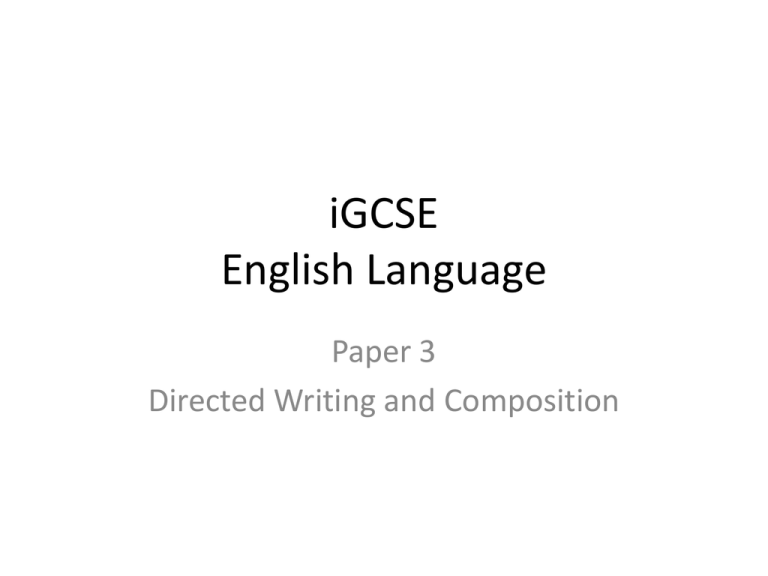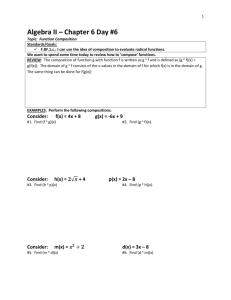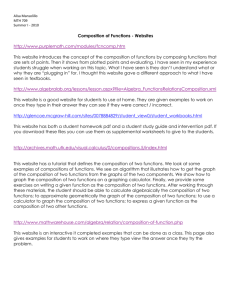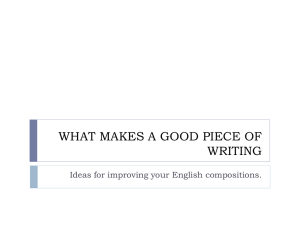iGCSE English Language Paper 3: Writing & Composition Guide
advertisement

iGCSE English Language Paper 3 Directed Writing and Composition Paper 3 – Part 1 • For this question, you will need to put yourself into role, and address your audience directly. • The opening needs to clearly introduce the situation and purpose of the task, and will be rewarded if it puts the reader in the picture. Paper 3 – Part 1 • You need to be clear and often persuasive in tasks like these so imagining that you are addressing someone in front of you might help you to keep that in mind. Do not be overly casual though- this is a formal piece of writing. Even if it is for your peers in a school magazine, written language for publication is less colloquial than spoken language. Paper 3 – Part 1 • Your answer will not be in the same genre as either of the texts, and should therefore be in a different style from both of them. Paper 3 – Part 1 • You will try to use as many ideas from the passages as possible, as they will all be relevant but you will have to change the way you express them; all the material you use from the passages must be modified to suit the new genre. Paper 3 – Part 1 • Do not write as yourself unless you are specifically told to do so and keep in mind why you are writing – for example are you meant to be persuading someone or offering advice? Paper 3 – Part 1 • There will almost certainly be two texts, perhaps in different genres e.g. a letter and a dialogue. The question will require you to assimilate information from both texts so you must not ignore one of them but don’t just lift from the text(s) word for word .You need to find the ideas and use them. Paper 3 – Part 1 • The recommended structure for the response will be offered in the wording of the question, and you should follow this. Paper 3 – Part 1 • There will be at least two factors to focus on – for example advantages and disadvantages. You will need to make two lists before you start in order to make sure you have enough material for both sides of the question. Examiners will use A and B, or pros and cons, in the margin to identify points on each side and to assess the balance of the two. Paper 3 – Part 1 • The third element of this question is evaluation; you will have to decide which of several options is better and present reasons why you have formed this opinion and justify it. Paper 3 – Part 1 • Keep your focus on what the question is asking you to do .Do not get distracted by peripheral issues; for instance if you are asked how money should be spent, don’t discuss the fund-raising methods. Paper 3 – Part 1 • Make strong transitions between points/paragraphs e.g. ‘Yet another reason to support this proposal is...’ You need to link your ideas together logically so if someone in real life was reading this response they would follow what you were saying step by step. Paper 3 – Part 1 • Though you cannot make up things which are not in the passages, you should try to use your own ideas in the way that you extend those of the passages, provided that they are ‘based on the reading material’. Paper 3 – Part 1 • The ending needs to be definite and provide an effective and satisfying conclusion to the piece. Paper 2 – Question 2 • It is essential that you choose a question out of the six available which you understand and which suits your writing abilities. Paper 2 – Question 2 • Though the three different genres are marked according to the same mark scheme for Style and Accuracy, they are marked differently for Content and Structure. The three genres are different from each other, so you need to be aware of the characteristics of each. Paper 2 – Question 2 • Whichever type of essay you choose, it should be planned first. If after 5 minutes you have only managed to collect a few ideas for your choice of title, switch to another one. • The plan should contain between 6 to 10 points or ideas, which can be developed into paragraphs, if the essay is going to be of a suitable content and length. Aim for about 8 paragraphs and 400 words. Paper 2 – Question 2 • Openings to compositions are important as they either engage the reader or they don’t. • Try to grab your reader’s attention from the start. Paper 2 – Question 2 • Take the opportunity to show off your range of vocabulary – find precise words to use and vary your choices Paper 3 Argumentative Compositions • Be clear about the difference between an argumentative and a discursive essay. When asked directly to give your own opinion you should commit yourself to a line of argument. • When asked to give a range of possible views then you are being discursive and may or may not choose to say what you personally believe. Paper 3 Argumentative Compositions • Mention counter arguments – and dispute them. A strong argument includes refutation of the other point of view. This way you can show that you are not being purely ignorant or prejudiced in your response. It is important to show balance in presenting the argument. Paper 3 Argumentative Compositions • If you are having difficulty finding enough points to support your stance you should consider arguing the opposite view – it might be easier! Paper 3 Argumentative Compositions • Aim for an effective introduction which captures attention and makes the topic and context clear. Paper 3 Argumentative Compositions • You should end on the side you are arguing for structure your essay so that you deal with the other side first and end strongly to clinch your argument with a final convincing point . Do not repeat yourself - ‘To sum up’ and ‘In conclusion’ are not strong endings as you won’t be saying anything new to convince your reader. Paper 3 Argumentative Compositions • It is generally advisable to argue your own personal viewpoint as it is likely to sound more convincing. It is however, possible, to argue effectively for or against an argument which you • have never considered before, provided that you can marshal some evidence from the media, facts, statistics and experience. These are the areas from which you draw your supporting detail and illustration. Paper 3 Argumentative Compositions • Sometimes there is a single word in the question which alters the emphasis of the argument, for instance the word ‘compulsory’. Make sure you pay attention to the key words in questions when you are planning and answering – it is worth underlining key words to remind you. Paper 3 Paper 2 – Question 3 Argumentative Compositions • Try using personal pronouns - ‘I’, ‘you’ and ‘we’ can make your argument seem more authentic and inclusive. Paper 3 Paper 2 – Question 3 Argumentative Compositions • Do not start each paragraph with a numbered pointfirstly, secondly, thirdly and so on- as this can get tedious for the reader and sound quite artificial if the ideas are not in fact sequential. • Use other paragraph linking words, the ones which show whether your argument is continuing in the same direction (e.g. ‘furthermore’, ‘in addition’) or changing direction (e.g. ‘nevertheless’, ‘on the other hand’). The key is to make sure that your argument is “building” as you go. Use your connectives to help you take your reader with you so that they can follow your train of thought all the way through. Paper 3 Argumentative Compositions • Three-point structures (sometimes called tricolons) can sound authoritative, e.g. ‘involving the learners, the teachers and the parent’. More than three of anything becomes a list; fewer lacks persuasive impact and overuse of tricolons is rarely effective. Paper 3 Descriptive Compositions • It is difficult to write interesting descriptions, so this type of composition should not be • attempted unless you have had practice and success at this type of writing. To write a strong • descriptive answer you will need to use a wide range of vocabulary and even use imagery • to engage reader interest. Unless the reader can see the picture they will not be able to relate to • the experience. Paper 3 Descriptive Compositions • You will need to use a variety of sentence structures. All forms of repetition should be • avoided – unless you are deliberately using it carefully for effect. Paper 3 Descriptive Compositions • You will need to evoke all five senses to create an environment and atmosphere, as well • as details of size, shape and colour. Make colour precise, e.g. ‘scarlet’, ‘azure’, ‘off-white’, • ‘bluish-grey’ Paper 3 Descriptive Compositions • Try to avoid common, overused, vague, short and childish vocabulary, such as ‘nice’, • ‘big’, ‘little’, ‘a lot of’, ‘good’, and ‘bad’. Paper 3 Descriptive Compositions • Each noun probably needs one or more adjectives in front of it to give sufficient detail Paper 3 Descriptive Compositions • Don’t let your description become static - give structure and progression to your • description e.g. moving towards or through something, such as a street market or busy shopping mall, or going through a period of time, an hour or a day for instance, and recording the changes Paper 3 Descriptive Compositions • mall, or going through a period of time, an hour or a day for instance, and recording the changes Paper 3 Descriptive Compositions • Descriptive compositions must not become a narrative, which means character and event should • not take over or be dominant. (You can have lots of description in a story but you should have as • little “story” in a description as possible) Paper 3 Narrative Compositions • Decide on a tense and then stick to it; do not jump between present and past. The normal narrative tense is past and those who try to write in the present usually forget to do so after a while, so it is safer to start off in the past. Paper 3 Narrative Compositions • Know what your last sentence is going to be before you write your first. A narrative has to build up to a climax and lead towards a conclusion which is planned before it starts or it will end lamely or incomprehensibly, or the pace will be too slow or too fast. Paper 3 Narrative Compositions • Don’t try to do too much; you can’t cover many events and many years in one short composition. Select key moments and skip over the rest, changing the pace according to the intensity of the moment. Paper 3 Narrative Compositions • Do not try to include too many characters (generally fewer than three is best) Don’t try to give them all speech. Paper 3 Narrative Compositions • For the top grade, complexity of narrative and structure is required e.g. framing the story; flashback or forward time jump; two parallel strands being brought together. However, do not attempt these devices unless you are sure you can manage them. Paper 3 Narrative Compositions • Use dialogue by all means (if you can punctuate and set it out correctly) but don’t overdo it. You shouldn’t turn your story into a play, nor should you dilute the effect of occasional and significant moments of speech by giving the characters trivial things to say throughout. • Save speech for important moments. Paper 3 Narrative Compositions • If you do use dialogue, find synonyms for ‘he said/she said’. Paper 3 Narrative Compositions • Even narrative needs description. You need to help your reader imagine characters and places by adding significant details to bring them alive . Paper 3 Narrative Compositions • Choose to tell your narrative in first or third person and stick with your choice; do not switch viewpoint accidentally, as this is confusing for the reader. Paper 3 Narrative Compositions • Do not use a first person narrator if you want to die at the end of your story! It is generally safer to use third person narration as it gives you more flexibility and a wider viewpoint. Paper 3 Narrative Compositions • Do not end your story with ‘And then I woke up in hospital’, or ‘It was all a dream’. • Try to avoid clichés of any kind, including stereotyped characters and predictable outcomes. Paper 3 Narrative Compositions • Use similes, but avoid obvious ones such as ‘as red as a rose’. Make comparisons unusual, but still apt, by giving them a moment’s thought and making them more specific e.g. ‘as red as a matador’s cape’. Paper 3 Narrative Compositions • Use plenty of interesting details to engage your reader and make them want to read on. Paper 3 Narrative Compositions • Don’t exaggerate; too much gore or too many unlikely events become ridiculous, and fear is more believable when it is mental rather than physical. Paper 3 Narrative Compositions • Use your own knowledge and experiences as inspiration. It is better to think of something that actually happened to you, or someone you know, or which you read in a book or saw in a film, than to try to make up something entirely from scratch. It will sound more convincing. You will need to adapt, embellish and exaggerate the original idea to make it relevant, fresh and memorable - just retelling the plot synopsis or giving a factual account is not likely to interest your reader Paper 3 Narrative Compositions • Keep a balance in the different parts of the narrative. An over-long introduction reduces the • effect of the middle section where things build up to a climax, and you need to leave yourself time • to create a memorable ending. Paper 3 Narrative Compositions • End your narrative deliberately. Stories need a conclusion, where things are either resolved or • left unresolved as a cliff-hanger (though on the whole readers prefer to know how a story ended.). • You must not give the impression that you stopped writing because you ran out of time, ink or • ideas.



